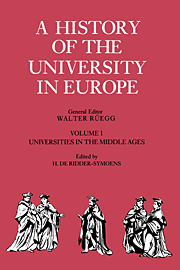Book contents
- Frontmatter
- Contents
- List of maps
- Contributors and editors
- Reader's guide
- Bibliographical abbreviations used in notes
- FOREWORD
- Acknowledgements
- PART I THEMES AND PATTERNS
- PART II STRUCTURES
- PART III STUDENTS
- PART IV LEARNING
- THE FACULTY OF ARTS
- CHAPTER 10.1 THE TRIVIUM AND THE THREE PHILOSOPHIES
- CHAPTER 10.2 THE QUADRIVIUM
- CHAPTER 11 THE FACULTY OF MEDICINE
- CHAPTER 12 THE FACULTIES OF LAW
- CHAPTER 13 THE FACULTY OF THEOLOGY
- EPILOGUE
- Editors' note on the indexes
- Name index
- Geographical and subject index
CHAPTER 12 - THE FACULTIES OF LAW
- Frontmatter
- Contents
- List of maps
- Contributors and editors
- Reader's guide
- Bibliographical abbreviations used in notes
- FOREWORD
- Acknowledgements
- PART I THEMES AND PATTERNS
- PART II STRUCTURES
- PART III STUDENTS
- PART IV LEARNING
- THE FACULTY OF ARTS
- CHAPTER 10.1 THE TRIVIUM AND THE THREE PHILOSOPHIES
- CHAPTER 10.2 THE QUADRIVIUM
- CHAPTER 11 THE FACULTY OF MEDICINE
- CHAPTER 12 THE FACULTIES OF LAW
- CHAPTER 13 THE FACULTY OF THEOLOGY
- EPILOGUE
- Editors' note on the indexes
- Name index
- Geographical and subject index
Summary
The origins and early history of law faculties
The University of Bologna is first heard of at the end of the eleventh century, when it was probably a private secular institution. Its faculty of law, the first in Europe, was to be the prototype and model of all others until the end of the old regime. Bologna, a city of perhaps no more than 10,000 souls in the eleventh and twelfth centuries, did not absorb the studium there but took on a distinctive character from its presence. And the studium, wooed by the spiritual and temporal powers alike, sided with neither and received the favours of both.
The privileges known as the Authentica Habita conferred on the studium by the Emperor Frederick I Barbarossa are evidence of the lively imperial interest in Bologna. Although referring explicitly to the students coming to Italy (most of them to study civil and canon law), they implicitly grant the Bologna studium a measure of independence and support against the comune or municipal authorities. The papacy, on the other hand, supported the students as a means of exerting indirect influence on the comune, and implicitly on the German emperors' policy towards Italy, in the feud between Guelphs and Ghibellines. That was the purpose of the bull of 1217 in which Pope Honorius III took the students' part against the comune. The teaching of ecclesiastical subjects in Bologna, such as canon law from the time of Gratian onwards, gave the popes a doctrinal interest, so to speak, in the masters and students there.
- Type
- Chapter
- Information
- A History of the University in Europe , pp. 388 - 408Publisher: Cambridge University PressPrint publication year: 1991
- 5
- Cited by



